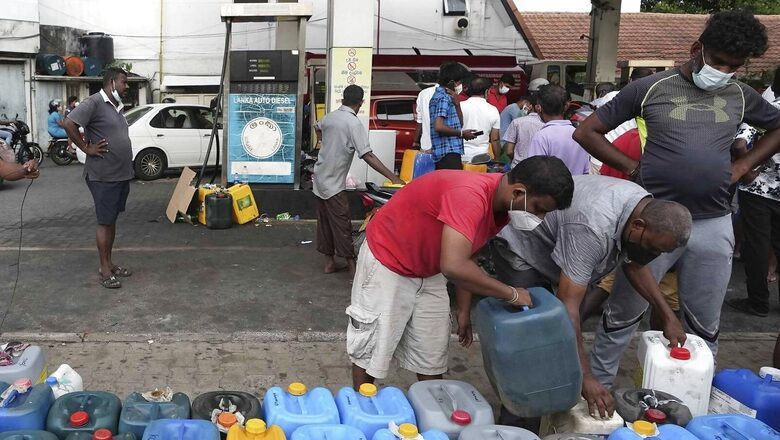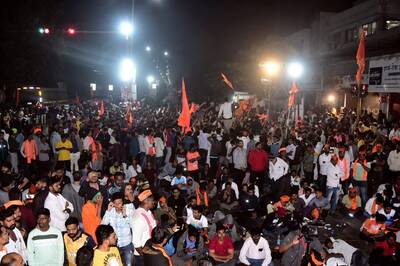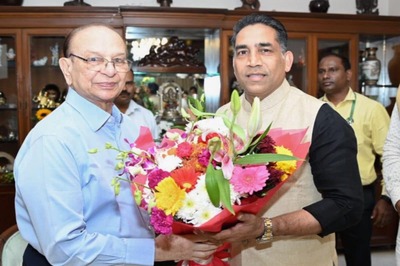
views
The economic crisis in Sri Lanka is deepening and the government there is taking strict measures, including imposing emergency, to deal with the protests over the country’s worst financial woe in decades. The crisis is not sudden but it had been simmering for quite some time and rating agencies have also warned about it in the past.
The government has taken severe measures to deal with the economic crisis and protests over it. It has imposed a 36-hour-long curfew, declared the ‘State of Emergency’ to curb the protests, banned social media and is even turning off street lights to save electricity, among others .
The Island nation of 2.2 crore people has rolled out blackouts for up to 13 hours a day as the government doesn’t have adequate forex reserves to pay for import of fuel. “We have already instructed officials to shut off street lights around the country to help conserve power,” Power Minister Pavithra Wanniarachchi said.
The current economic crisis is a result of economic mismanagement by successive governments and has been accelerated by the deep tax cuts promised during the 2019 polls by Sri Lankan President Gotabaya Rajapaksa. Currently, Sri Lanka is unable to pay for essential imports, including oil, that led to power cuts lasting up to 13 hours.
Forex Reserves
Sri Lanka’s foreign exchange (forex) reserves have depleted by 70 per cent to USD 2.3 billion as of February in the past two years, thus impacting the country’s ability to pay for its imports. It has debt payments of about USD 4 billion through the rest of the year.
Soaring Inflation
The country’s inflation rate is at an elevated level. Its retail inflation in February stood at 17.5 per cent, the highest level since 2015, driven by rate hikes in both food (24.7 per cent) and non-food (11 per cent) categories. The inflation in January 2022 stood at 16.8 per cent.
The inflation has been further stocked by Sri Lanka last month devaluing its local currency and imposing import limits on hundreds of items that disrupted value chains and pushed up consumer prices that were already sky high.
Job Losses
Following the COVID-19 pandemic, Sri Lanka’ tourism industry was hit badly, which adversely affected its foreign exchange reserve and led to job losses. It also raised the number of poors living in the country. The share of the poor based on a daily income of USD 3.20 was estimated to have grown to 11.7 per cent during 2020 in the country as compared with 9.2 per cent in the previous year, according to a report by the World Bank.
Aids for Sri Lanka
On March 17, India extended a USD 1-billion credit facility to Sri Lanka following an agreement signed between the two governments last month during the visit of Sri Lankan Finance Minister Basil Rajapaksa. A consignment of 40,000 metric tonnes of diesel from India reached Sri Lanka on Saturday, the fourth such assistance from New Delhi. Traders here also loaded about 40,000 tonnes of rice for shipment to Sri Lanka in a major food aid.
The Sri Lanka’s government is preparing for talks with the International Monetary Fund (IMF) amid concerns over the country’s ability to pay back foreign debt. The country has devalued its currency ahead of the talks.
Early Warnings
The Asian Development Bank in 2019 had called Sri Lanka a “twin deficit economy”. “Twin deficits signal that a country’s national expenditure exceeds its national income, and that its production of tradable goods and services is inadequate,” it had said.
In December 2021, rating agency Fitch downgraded Sri Lanka’s sovereign rating to ‘CC’ from ‘CCC’. It said there was an increased probability of a default in coming months in light of the country’s worsening external liquidity position underscored by a drop in foreign exchange reserves.
The agency said that the downgrade reflects its view of an increased probability of a default event in coming months in light of Sri Lanka’s worsening external liquidity position, underscored by a drop in foreign-exchange reserves set against high external debt payments and limited financing inflows. “The severity of financial stress is illustrated by elevated government-bond yields and downward pressure on the currency.”
Read all the Latest Business News and Breaking News here




















Comments
0 comment